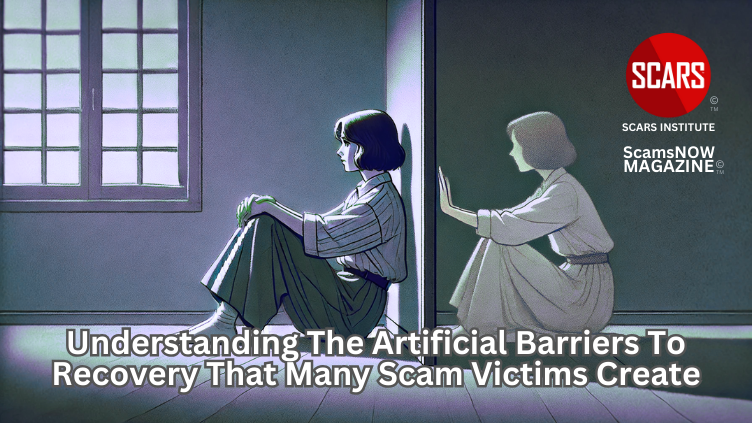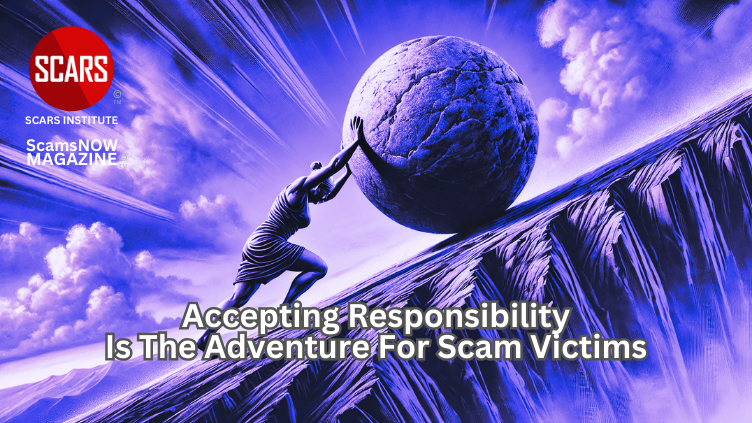Accepting Responsibility is the Adventure for Scam Victims on the Road to Recovery
The Transformative Adventure of Responsibility in Scam Victim Recovery
Primary Category: Scam Victim Recovery Psychology
Intended Audience: Scam Victims-Survivors / Family & Friends
Author:
• Tim McGuinness, Ph.D. – Anthropologist, Scientist, Director of the Society of Citizens Against Relationship Scams Inc.
• Based, in part, on interpretations of the works of Dr. Jordan B. Peterson
About This Article
The journey to recovery after a scam is not just about healing from financial and emotional loss—it is about transformation. Many victims initially struggle with feelings of helplessness, betrayal, and shame, but true healing comes when they take responsibility for their recovery. Jordan B. Peterson has often spoken about the connection between responsibility and adventure, emphasizing that taking responsibility for one’s life is not just a burden but a pathway to personal growth. “The adventure that you have voluntarily undertaken is the same thing as the responsibility that you assume,” Peterson states.
This perspective reframes recovery not as something victims are forced to endure, but as an empowering journey toward rebuilding their lives. Accepting responsibility allows scam victims to move forward, make intentional decisions, and regain control over their future. It requires facing fears, embracing discomfort, and actively engaging in the process of healing. Though challenging, this path leads to a deeper sense of purpose, resilience, and confidence. Rather than remaining stuck in victimhood, those who take ownership of their recovery embark on a transformative adventure—one where they emerge stronger, wiser, and better equipped to navigate life’s challenges.

The Transformative Adventure of Responsibility in Scam Victim Recovery
Scam victims often feel like their world has collapsed. The emotional devastation, financial loss, and betrayal can create an overwhelming sense of despair. Many victims initially react by withdrawing, hoping time alone will heal their wounds. However, true recovery does not come from avoidance—it comes from responsibility. Taking responsibility for your own recovery is not about self-blame; it is about reclaiming control over your life.
Jordan B. Peterson, the renowned clinical psychologist and professor, has often spoken about the deep connection between responsibility and adventure. He argues that assuming responsibility for your life is not merely a burden—it is the path to transformation.
“The adventure that you have voluntarily undertaken is the same thing as the responsibility that you assume,” Peterson states.
His view suggests that when you willingly take responsibility for something difficult, you embark on a meaningful journey. This concept is particularly relevant for scam victims who need to move from despair to empowerment. The path to recovery is not just a necessity—it is an adventure that reshapes your identity and strengthens your resilience.
Responsibility as the Foundation for Healing
One of the greatest struggles scam victims face is accepting that their recovery is in their own hands. It is easy to feel helpless, to believe that healing should come from external sources—time, law enforcement, financial restitution, or the support of others. While these factors may help, none of them can replace personal responsibility in the recovery process.
Peterson emphasizes that responsibility is not just about obligation but about purpose. He states, “The meaning that sustains you in life is to be found in responsibility.” When you take charge of your recovery, you shift from being a passive victim to an active participant in your own healing.
This means confronting difficult emotions instead of suppressing them. It means learning about scams, fraud psychology, and recovery strategies so that you never fall victim again. It means seeking support from people who understand what you are going through, even if that feels uncomfortable at first. It means making conscious financial and emotional decisions to rebuild your life instead of staying stuck in fear and regret.
Facing the Unknown: The Adventure in Responsibility
When people hear the word adventure, they often imagine travel, risk, or exploration. But Peterson reframes adventure as something much deeper: the process of willingly facing the unknown. “To take responsibility is to transform the chaos of potential into the realities of habitable order,” he explains. This means that embracing responsibility allows you to turn the chaos of trauma into a structured path forward.
For scam victims, recovery is an unknown territory. It requires stepping outside of emotional comfort zones, challenging negative thoughts, and developing new skills. It demands that you let go of the past, release self-blame, and build a future that is not defined by the scam. Every step you take—whether it is attending a support group, rebuilding financial stability, or regaining self-confidence—is an act of bravery.
Scam victims who refuse to engage in their recovery often live in a loop of avoidance and pain. They wait for healing to happen to them, but true healing only comes from stepping into the unknown with determination. The adventure of responsibility is not about ignoring suffering—it is about walking through it and emerging stronger on the other side.
Overcoming the Fear of Responsibility
One of the main reasons victims avoid responsibility is fear. Fear of facing the full reality of what happened. Fear of confronting shame. Fear of taking steps forward only to stumble again. But as Peterson frequently emphasizes, fear is not an excuse to retreat—it is a signal that you are at the edge of personal transformation.
He states, “If you face the demands of life voluntarily, you can find yourself in an adventure.” The moment you decide to actively engage in your own recovery, you step into that adventure. You begin rewriting your story, not as someone permanently wounded by a scam, but as someone who refuses to let deception define them.
The Long-Term Transformation
The deeper truth about taking responsibility for recovery is that it does not just heal the immediate pain—it fundamentally transforms who you are. Peterson often discusses how meaningful suffering leads to greater wisdom and personal strength. Scam victims who engage fully in their recovery develop a resilience that extends beyond this single experience. They become more discerning, emotionally aware, and confident in their ability to navigate life’s challenges.
Instead of living in fear of being deceived again, they become proactive in protecting themselves. Instead of isolating themselves out of shame, they use their experience to help others. Instead of being consumed by regret, they extract valuable lessons that inform their future choices.
Peterson describes this as the process of finding meaning through struggle. “If you take on all the responsibility you can, you may find that it is more than you can manage. But if you don’t take responsibility, then you’re just stuck with life.” Scam victims who reject responsibility remain trapped in the past. Those who embrace it turn their pain into purpose.
Choosing to Recover
Ultimately, scam victims must decide whether they will remain in a passive state of suffering or actively participate in their own recovery. Responsibility is the only way forward. It is not an unfair burden—it is the key to rebuilding self-trust, financial security, and emotional well-being.
The path is not easy. It requires honesty, courage, and persistence. But as Peterson points out, “If you are willing to make the sacrifice, you will develop in proportion to the amount that you are willing to bear.” Scam victims who commit to their recovery do not just survive the experience—they emerge stronger, wiser, and more capable than before.
The adventure of responsibility is waiting. The choice to embark on it is yours.
10 Steps to Accepting Responsibility for Recovery After a Scam
Accepting responsibility for your recovery is the first and most crucial step toward healing after being scammed. This does not mean blaming yourself for what happened, but rather recognizing that your healing and future well-being are within your control. Here are ten steps to help you take ownership of your recovery and move forward with strength and resilience.
Step 1: Acknowledge That No One Else Can Heal for You
Recovery is a personal journey, and no one—not law enforcement, financial institutions, or even a support group—can do the work for you. Others can offer guidance, but you must take the steps necessary to heal. Waiting for external forces to make you feel better will only prolong your suffering. The sooner you accept that your healing is your responsibility, the sooner you can start moving forward.
Step 2: Stop Dwelling on “Why Me?” and Focus on “What Now?”
It is natural to ask why you were targeted, but dwelling on that question will not change what happened. Instead, shift your focus to what you can do now to reclaim control. Ask yourself: What can I do today to take a step toward recovery? This mental shift moves you from a place of helplessness to a place of empowerment.
Step 3: Take Ownership of Your Emotional Healing
Avoidance, denial, and suppression of emotions will only delay your recovery. Accept that you will feel grief, shame, anger, and self-doubt—but these emotions do not have to define you. Take responsibility for addressing them in healthy ways, whether through journaling, therapy, or talking with trusted support groups. Your emotional well-being is in your hands.
Step 4: Accept That Recovery Requires Effort and Discomfort
Healing from a scam is not easy. It requires confronting painful emotions, revisiting financial losses, and learning from the experience. Many victims avoid support groups or educational resources because they fear discomfort. But growth happens when you lean into the challenge instead of running from it. Understand that facing reality—even when it is painful—is part of reclaiming your life.
Step 5: Confront Your Fears About Judgment and Shame
Many scam victims avoid seeking help because they fear being judged. But the truth is, those who have been scammed understand your pain. The only judgment that truly matters is your own. If you continue to judge yourself harshly, you will stay trapped in guilt. Instead, forgive yourself and accept that seeking support is a sign of strength, not weakness.
Step 6: Learn From the Scam Instead of Letting It Define You
Taking responsibility means using the scam as a learning experience rather than an identity. Research the tactics that were used against you, understand how fraud works, and educate yourself so you are never in that position again. Knowledge is power, and the more you learn, the more control you regain over your life.
Step 7: Rebuild Your Confidence by Taking Small Steps
Scams often shatter self-trust, making it hard to believe in your own decision-making. Start rebuilding that trust by taking small, intentional steps toward recovery. Make a plan for financial stability, reconnect with supportive people, or set personal goals. Each small step forward reinforces that you are capable of taking charge of your own life again.
Step 8: Let Go of the Need for Perfect Justice
Many victims wait for law enforcement or financial institutions to bring them closure. While justice is important, it is not always guaranteed. If you tie your recovery to the outcome of an investigation, you may never feel at peace. True healing comes when you accept that, regardless of legal outcomes, you still have the power to rebuild your life.
Step 9: Surround Yourself With People Who Encourage Growth
The people you choose to engage with during recovery matter. If you spend time with those who fuel your victimhood and keep you in a state of anger, you will remain stuck. Seek out those who push you toward healing, provide constructive support, and encourage you to take responsibility for moving forward.
Step 10: Commit to Action, Not Just Awareness
Understanding what needs to be done is not enough—you have to take action. Whether it is joining a support group, seeking therapy, or rebuilding your finances, real change comes from doing. Every day, ask yourself: What action am I taking today to move forward? Responsibility is not about blame; it is about choosing to actively participate in your own recovery.
Final Thought
Recovery from a scam is not about erasing the past but about building a future where you are stronger, wiser, and more resilient. The sooner you take responsibility for your healing, the sooner you will reclaim your confidence and sense of self. No one can do it for you—but you are fully capable of doing it for yourself.
-/ 30 /-
What do you think about this?
Please share your thoughts in a comment below!
Statement About Victim Blaming
SCARS Institute articles examine different aspects of the scam victim experience, as well as those who may have been secondary victims. This work focuses on understanding victimization through the science of victimology, including common psychological and behavioral responses. The purpose is to help victims and survivors understand why these crimes occurred, reduce shame and self-blame, strengthen recovery programs and victim opportunities, and lower the risk of future victimization.
At times, these discussions may sound uncomfortable, overwhelming, or may be mistaken for blame. They are not. Scam victims are never blamed. Our goal is to explain the mechanisms of deception and the human responses that scammers exploit, and the processes that occur after the scam ends, so victims can better understand what happened to them and why it felt convincing at the time, and what the path looks like going forward.
Articles that address the psychology, neurology, physiology, and other characteristics of scams and the victim experience recognize that all people share cognitive and emotional traits that can be manipulated under the right conditions. These characteristics are not flaws. They are normal human functions that criminals deliberately exploit. Victims typically have little awareness of these mechanisms while a scam is unfolding and a very limited ability to control them. Awareness often comes only after the harm has occurred.
By explaining these processes, these articles help victims make sense of their experiences, understand common post-scam reactions, and identify ways to protect themselves moving forward. This knowledge supports recovery by replacing confusion and self-blame with clarity, context, and self-compassion.
Additional educational material on these topics is available at ScamPsychology.org – ScamsNOW.com and other SCARS Institute websites.
-/ 30 /-
What do you think about this?
Please share your thoughts in a comment below!
One Comment
Leave A Comment
Important Information for New Scam Victims
- Please visit www.ScamVictimsSupport.org – a SCARS Website for New Scam Victims & Sextortion Victims.
- SCARS Institute now offers its free, safe, and private Scam Survivor’s Support Community at www.SCARScommunity.org – this is not on a social media platform, it is our own safe & secure platform created by the SCARS Institute especially for scam victims & survivors.
- SCARS Institute now offers a free recovery learning program at www.SCARSeducation.org.
- Please visit www.ScamPsychology.org – to more fully understand the psychological concepts involved in scams and scam victim recovery.
If you are looking for local trauma counselors, please visit counseling.AgainstScams.org
If you need to speak with someone now, you can dial 988 or find phone numbers for crisis hotlines all around the world here: www.opencounseling.com/suicide-hotlines
Statement About Victim Blaming
Some of our articles discuss various aspects of victims. This is both about better understanding victims (the science of victimology) and their behaviors and psychology. This helps us to educate victims/survivors about why these crimes happened and not to blame themselves, better develop recovery programs, and help victims avoid scams in the future. At times, this may sound like blaming the victim, but it does not blame scam victims; we are simply explaining the hows and whys of the experience victims have.
These articles, about the Psychology of Scams or Victim Psychology – meaning that all humans have psychological or cognitive characteristics in common that can either be exploited or work against us – help us all to understand the unique challenges victims face before, during, and after scams, fraud, or cybercrimes. These sometimes talk about some of the vulnerabilities the scammers exploit. Victims rarely have control of them or are even aware of them, until something like a scam happens, and then they can learn how their mind works and how to overcome these mechanisms.
Articles like these help victims and others understand these processes and how to help prevent them from being exploited again or to help them recover more easily by understanding their post-scam behaviors. Learn more about the Psychology of Scams at www.ScamPsychology.org
SCARS INSTITUTE RESOURCES:
If You Have Been Victimized By A Scam Or Cybercrime
♦ If you are a victim of scams, go to www.ScamVictimsSupport.org for real knowledge and help
♦ SCARS Institute now offers its free, safe, and private Scam Survivor’s Support Community at www.SCARScommunity.org/register – this is not on a social media platform, it is our own safe & secure platform created by the SCARS Institute especially for scam victims & survivors.
♦ Enroll in SCARS Scam Survivor’s School now at www.SCARSeducation.org
♦ To report criminals, visit https://reporting.AgainstScams.org – we will NEVER give your data to money recovery companies like some do!
♦ Follow us and find our podcasts, webinars, and helpful videos on YouTube: https://www.youtube.com/@RomancescamsNowcom
♦ Learn about the Psychology of Scams at www.ScamPsychology.org
♦ Dig deeper into the reality of scams, fraud, and cybercrime at www.ScamsNOW.com and www.RomanceScamsNOW.com
♦ Scam Survivor’s Stories: www.ScamSurvivorStories.org
♦ For Scam Victim Advocates visit www.ScamVictimsAdvocates.org
♦ See more scammer photos on www.ScammerPhotos.com
You can also find the SCARS Institute’s knowledge and information on Facebook, Instagram, X, LinkedIn, and TruthSocial
Psychology Disclaimer:
All articles about psychology and the human brain on this website are for information & education only
The information provided in this and other SCARS articles are intended for educational and self-help purposes only and should not be construed as a substitute for professional therapy or counseling.
Note about Mindfulness: Mindfulness practices have the potential to create psychological distress for some individuals. Please consult a mental health professional or experienced meditation instructor for guidance should you encounter difficulties.
While any self-help techniques outlined herein may be beneficial for scam victims seeking to recover from their experience and move towards recovery, it is important to consult with a qualified mental health professional before initiating any course of action. Each individual’s experience and needs are unique, and what works for one person may not be suitable for another.
Additionally, any approach may not be appropriate for individuals with certain pre-existing mental health conditions or trauma histories. It is advisable to seek guidance from a licensed therapist or counselor who can provide personalized support, guidance, and treatment tailored to your specific needs.
If you are experiencing significant distress or emotional difficulties related to a scam or other traumatic event, please consult your doctor or mental health provider for appropriate care and support.
Also read our SCARS Institute Statement about Professional Care for Scam Victims – click here
If you are in crisis, feeling desperate, or in despair, please call 988 or your local crisis hotline – international numbers here.
More ScamsNOW.com Articles
A Question of Trust
At the SCARS Institute, we invite you to do your own research on the topics we speak about and publish. Our team investigates the subject being discussed, especially when it comes to understanding the scam victims-survivors’ experience. You can do Google searches, but in many cases, you will have to wade through scientific papers and studies. However, remember that biases and perspectives matter and influence the outcome. Regardless, we encourage you to explore these topics as thoroughly as you can for your own awareness.















![NavyLogo@4x-81[1] Accepting Responsibility is the Adventure for Scam Victims on the Road to Recovery - 2025](https://scamsnow.com/wp-content/uploads/2025/04/NavyLogo@4x-811.png)










![scars-institute[1] Accepting Responsibility is the Adventure for Scam Victims on the Road to Recovery - 2025](https://scamsnow.com/wp-content/uploads/2025/04/scars-institute1.png)

![niprc1.png1_-150×1501-1[1] Accepting Responsibility is the Adventure for Scam Victims on the Road to Recovery - 2025](https://scamsnow.com/wp-content/uploads/2025/04/niprc1.png1_-150x1501-11.webp)
Valid not only for victims of scams, but life in general as well.
Thank you